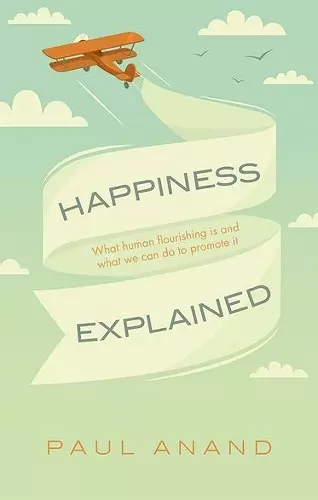Happiness Explained
What human flourishing is and what we can do to promote it
Format:Hardback
Publisher:Oxford University Press
Published:17th Mar '16
Currently unavailable, and unfortunately no date known when it will be back

What is human happiness and how can we promote it? These questions are central to human existence and Happiness Explained draws on scientific research from economics, psychology, and philosophy, as well as a range of other disciplines, to outline a new paradigm in which human flourishing plays a central role in the assessment of national and global progress. It shows why the traditional national income approach is limited as a measure of human wellbeing and demonstrates how the contributors to happiness, wellbeing, and quality of life can be measured and understood across the human life course. Discussing wide-ranging aspects, from parenting, decent employment, friendship, education, and health in old age, through to money, autonomy, and fairness, as well as personal strategies and governmental polices used in the pursuit of happiness, it offers a science-based understanding of human flourishing. Written by an economist involved in helping governmental organisations move 'beyond GDP', Happiness Explained shows how a wide range of factors that contribute to better and happier lives and how, together, they provide a new blueprint for the assessment of progress in terms of personal wellbeing.
An enjoyable and multifaceted tour... convincingly expounds the need for a rich conception of human well-being in order to quantify individual and social progress. * Reto Odermatt, Global Policy *
Happiness Explained is ... a useful primer for a non-technical reader setting out to understand this complex field * Tom Startup, Times Literary Supplement *
Paul Anand's brilliant book on happiness is also a fine contribution to the ethical foundations of economics. It combines exceptional lucidity with analytical rigour, and shows that the so-called dismal science need not be dismal at all. * Amartya Sen, Thomas W. Lamont University Professor, and Professor of Economics and Philosophy, Harvard University *
A helpful introduction for beginners to the current state of happiness research * Choice *
Economists are usually shy about happiness. Paul Anand is not. He writes with verve and clarity about ways to understand, measure, and promote human happiness. Drawing on psychology and philosophy as well as economics, he discusses how governments - and individuals - can increase the sum of happiness and quality of life. He offers a readable and intriguing guide to what ought to be - but rarely is - one of the most important policy issues for any government. * Frances Cairncross, previously Rector of Exeter College, Oxford *
Seeks to answer the most important question of all . . . and makes a convincing case for a schooling that cultivates the mind while developing young peoples good character and wellbeing. * Lord OShaughnessy, founder of Floreat Education *
Essential reading for anyone who has questioned that we are simply homo economici motivated solely or even primarily, by individualism and the endless pursuit of material wealth... insightful as it is pragmatic. * Health Prince, Lyndon B Johnson School of Public Policy, Austin Texas *
Shows how the capability approach of Sen and Nussbaum can be made operational and integrates the most important insights from the booming empirical literature on subjective happiness. This book will be a source of inspiration for everybody who believes that material consumption is not the only contributor to individual wellbeing. * Erik Schokkaert, Department of Economics, University of Leuven *
ISBN: 9780198735458
Dimensions: 226mm x 146mm x 16mm
Weight: 314g
158 pages